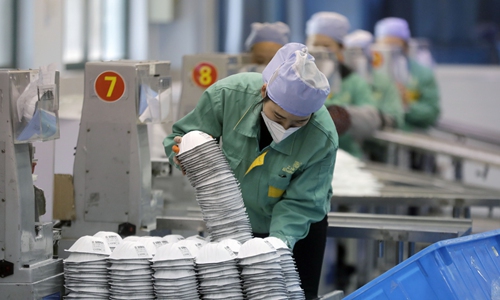HOME >> SOURCE
Price soars for core material of face masks
By Chi Jingyi Source:Global Times Published: 2020/2/27 18:40:18

An employee of Chinese face mask maker Dasheng Health Products Manufacture Co works at the company's factory in Shanghai, East China on Friday. Photo: Yang Hui/GT
The price of melt-blown fabric, a basic material to make masks, has soared in the Chinese market. Analysts said that while import demand has kept rising, domestic capacity will soon be released to ensure supply.
Affected by the novel coronavirus outbreak, face masks have become a protective necessity. The price of the melt-blown fabric jumped from 18,000 yuan ($2,567) per ton to nearly 200,000 yuan per ton now, according to market data.
Even with such a high price, the material is out of stock due to extraordinary market demand.
"We are out of stock and you need to wait. Only one roll of the fabric left, which is 1,700 meters long, 0.1 meters wide and 25 grams in weight," Liu Huicai, business manager of Dongguan Chuang Jie Filter Co based in South China's Guangdong Province, told the Global Times on Thursday.
The price of melt-blown fabric produced by the company is 16 yuan per roll, which means the retail price is 640,000 yuan per ton.
The company produces and also buys melt-blown fabric materials from other domestic companies for processing. Its upstream company is in Suzhou, East China's Jiangsu Province. The manager refused to predict when sales will resume.
"Imports of melt-blown fabric may increase in the short term, but by the middle of March, basically domestic capacity will be able to meet demand. It will take some time to release capacity," Xiang Shuangfei, research fellow at Department of Polymeric Materials of Tongji University, told the Global Times on Wednesday.
Vanhang, a customs clearance service company, told the Global Times that most of the melt-blown fabric imported recently came from Turkey.
"Companies are working overtime to produce masks, but they don't have enough melt-blown fabric, the production of which isn't that easy to scale up," said an industry insider whose hometown is Xinxiang, Central China's Henan Province, a mask production base.
Melt-blown fabric is the core material of mask, and its raw material is polypropylene (PP), refined from petroleum.
"Ordinary enterprises are not capable of producing the raw material PP. Only big enterprises like Sinopec and refineries can provide PP. A lack of raw materials and non-woven machinery are the main barriers to increasing mask supply," said Xiang.
Sinopec announced on Tuesday plans to increase the production of melt-blown fabric. The company can produce a total of 12 tons of melt-blown fabric per day, which can produce 3.6 million N95 masks or 18 million medical masks as early as March 8.
Posted in: INDUSTRIES